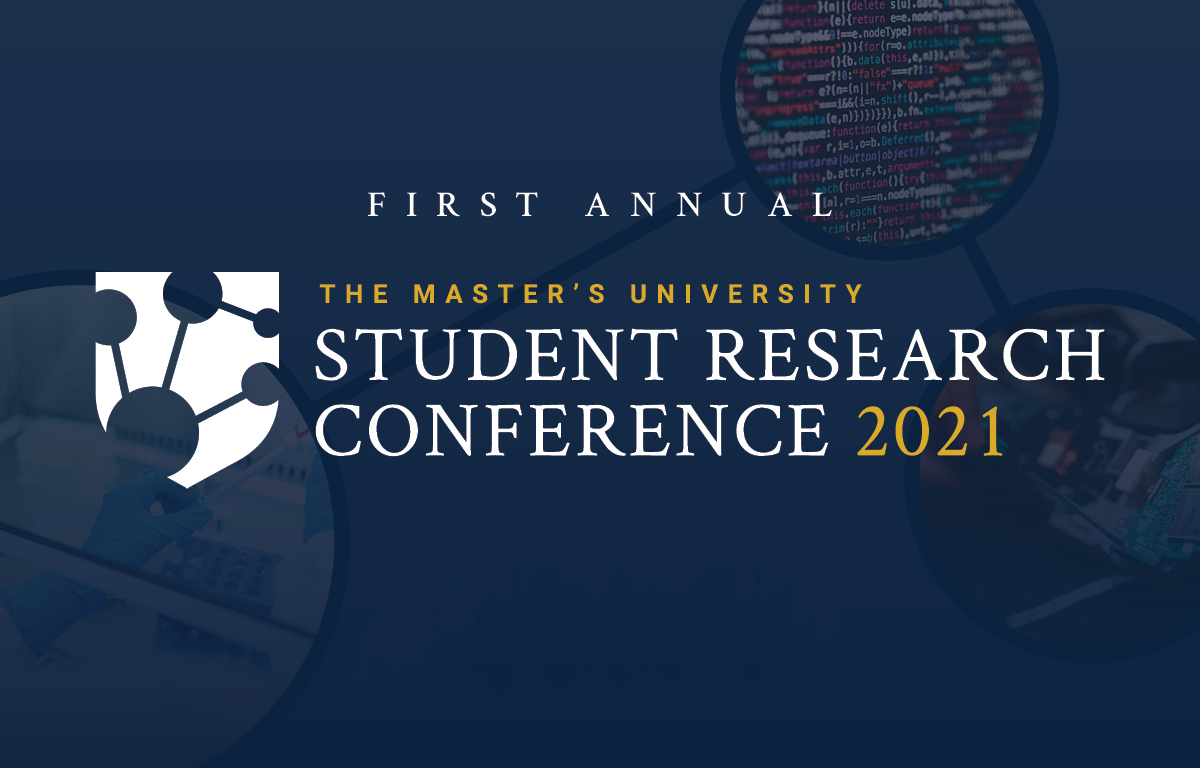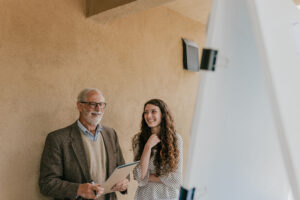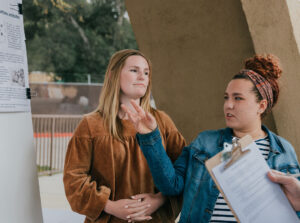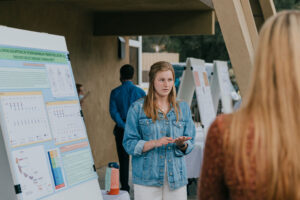
It was a familiar sight to The Master’s University’s biological and physical sciences department — observers and judges wandering among eye-catching posters, listening to students explain their most recent research projects.
But this time, the setting was different. Instead of the annual West Coast Biological Sciences Undergraduate Research Conference, TMU’s students presented their work right here on campus, sharing their accomplishments with classmates and professors.
On April 26 and 27, TMU hosted its first-ever Student Research Conference (SRC). The event was primarily designed to replace the West Coast conference, which was canceled due to COVID-19 concerns. But TMU co-organizers Dr. Joe Francis and Dr. Matthew McLain see unique benefits in hosting an on-campus symposium and hope to make it a yearly event.
Research has long been a focus of TMU’s science programs. “What graduate schools are looking for is students who know how to do research,” says McLain, an assistant professor of biology and geology. “If you have that as an undergrad, that’s a big jump up on everyone else.”

One way the department aims to give students that leg up is by encouraging them to join ongoing research projects spearheaded by faculty. There is always work to be done: from the research that Francis — dean of TMU’s School of Science, Mathematics, Technology & Health — has done on gut flora, to McLain’s investigations in paleontology.
But there has been a problem. “In the past, our students have felt like, ‘Well, I’m doing this research project, and the only people on campus who know about it are the people really close to me. And my roommate is done hearing about it,’” McLain says.
Faculty had considered hosting an on-campus event to give TMU’s community a chance to learn about the discoveries made by students. When COVID shut down the department’s usual outlet for presenting research, it offered the perfect opportunity to act on this idea.

In total, 11 projects were presented at the SRC – some by individual students, and some as collaborations. The topics ranged from botany to cellular microbiology.
Emily Scott, an environmental science and paleontology student and winner of the Tier 1 category (reserved for original research), presented her work on the fossils of creatures called synapsids. She demonstrated how her results contradict the traditional interpretation of these creatures under the evolutionary model.
Meanwhile, the winning presentation of the Tier 2 category (reserved for class projects) was a team effort. These students explained their method for fluorescently labeling bacteria — a necessary step in many projects — without needing to use a centrifuge.
Cellular and molecular biology student Bryan Powell was a member of this team. “It was a really great opportunity to practice what I want to do for the rest of my life throughout my research career,” he says. “I’ll need to know how to give a presentation, how to make a poster and how to get my ideas across to the judges. I was able to have the professors go over my technique and give me pointers.”
Emily Scott agrees that the experience was valuable: “The conference was a great opportunity to practice explaining my research to different people with varying amounts of background knowledge, and I learned a lot from it.”

A steady stream of people in the TMU community stopped by the conference, a warm response that confirmed McLain’s desire to see the SRC become a regular part of TMU’s campus calendar.
“We’ll still go to the West Coast conference when they open it up again,” he says. “But I think we have a particular need for something like this, and it’s exciting to be able to fill that need.”
McLain and Francis have big plans for what the conference could look like next year. For example, they hope to feature presentations from students in other departments. From the senior theses of our English majors to the creations of our music composition majors, departments across TMU’s campus are regularly producing original work. Future versions of the SRC could provide a platform for these students.
In the meantime, McLain believes that this first iteration of the SRC did exactly what it needed to. “It’s encouraging for students to have some kind of a product at the end of a research project,” he says. “That’s what we were hoping for, and I think that’s what happened.”
To learn more about TMU’s School of Science, Mathematics, Technology & Health, click here.

The Master’s University and Seminary admit students of any race, color, national and ethnic origin to all the rights, privileges, programs, and activities generally accorded or made available to students at the school. It does not discriminate on the basis of race, color, national and ethnic origin in the administration of its educational policies, admissions policies, scholarship and loan programs, and athletic and other school-administered programs.
21726 Placerita Canyon Road
Santa Clarita, CA 91321
1-800-568-6248
© 2025 The Master’s University Privacy Policy Copyright Info
| Cookie | Duration | Description |
|---|---|---|
| cookielawinfo-checkbox-analytics | 11 months | This cookie is set by GDPR Cookie Consent plugin. The cookie is used to store the user consent for the cookies in the category "Analytics". |
| cookielawinfo-checkbox-functional | 11 months | The cookie is set by GDPR cookie consent to record the user consent for the cookies in the category "Functional". |
| cookielawinfo-checkbox-necessary | 11 months | This cookie is set by GDPR Cookie Consent plugin. The cookies is used to store the user consent for the cookies in the category "Necessary". |
| cookielawinfo-checkbox-others | 11 months | This cookie is set by GDPR Cookie Consent plugin. The cookie is used to store the user consent for the cookies in the category "Other. |
| cookielawinfo-checkbox-performance | 11 months | This cookie is set by GDPR Cookie Consent plugin. The cookie is used to store the user consent for the cookies in the category "Performance". |
| viewed_cookie_policy | 11 months | The cookie is set by the GDPR Cookie Consent plugin and is used to store whether or not user has consented to the use of cookies. It does not store any personal data. |
Notifications